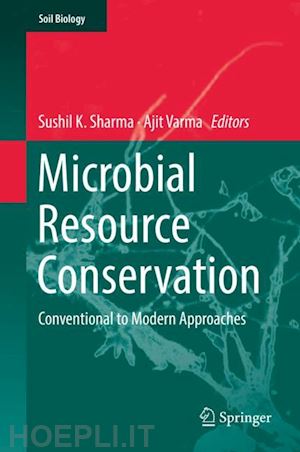
Questo prodotto usufruisce delle SPEDIZIONI GRATIS
selezionando l'opzione Corriere Veloce in fase di ordine.
Pagabile anche con Carta della cultura giovani e del merito, 18App Bonus Cultura e Carta del Docente
1. Microbial Genetic Resources: Status, Conservation, Access and Benefit Sharing (ABS) Regulations.- 2. Concept of Microbial Preservation: Past, Present and Future.- 3. Establishment and Management of Culture Collections of Microorganisms (mBRC): An Overview.- 4. Specialized Microbial Resource Centres: A Driving Force of the Growing Bioeconomy.- 5. Agricultural Microbial Genetic Resources: Application and Preservation at Microbial Resource Centres (mBRCs).- 6. Rhizobia: Culture Collections, Identification and Methods of Preservation.- 7. Biobank for Conservation of Arbuscular Mycorrhizal (AM) Fungi.- 8. Conservation of Fungi: A Review on Conventional Approaches.- 9. Veterinary Type Cultures and their Preservation: Status and Challenges.- 10. Biodiversity Conservation of Phages and Microbial Populations.- 11. Modern Immunochemical Approaches in Microbiology.- 12. Conservation and Application of Microalgae for Biofuel Production.- 13. Desert Truffles in Saudi Arabia: Diversity, Ecology, and Conservation.- 14. Maintenance, Conservation and Regulation of Microbial Resources for Defense Applications.- 15. Diversity, Ecology and Conservation of Fungal and Bacterial Endophytes.- 16. Archaea: Ecology, Application and Conservation.











Il sito utilizza cookie ed altri strumenti di tracciamento che raccolgono informazioni dal dispositivo dell’utente. Oltre ai cookie tecnici ed analitici aggregati, strettamente necessari per il funzionamento di questo sito web, previo consenso dell’utente possono essere installati cookie di profilazione e marketing e cookie dei social media. Cliccando su “Accetto tutti i cookie” saranno attivate tutte le categorie di cookie. Per accettare solo deterninate categorie di cookie, cliccare invece su “Impostazioni cookie”. Chiudendo il banner o continuando a navigare saranno installati solo cookie tecnici. Per maggiori dettagli, consultare la Cookie Policy.